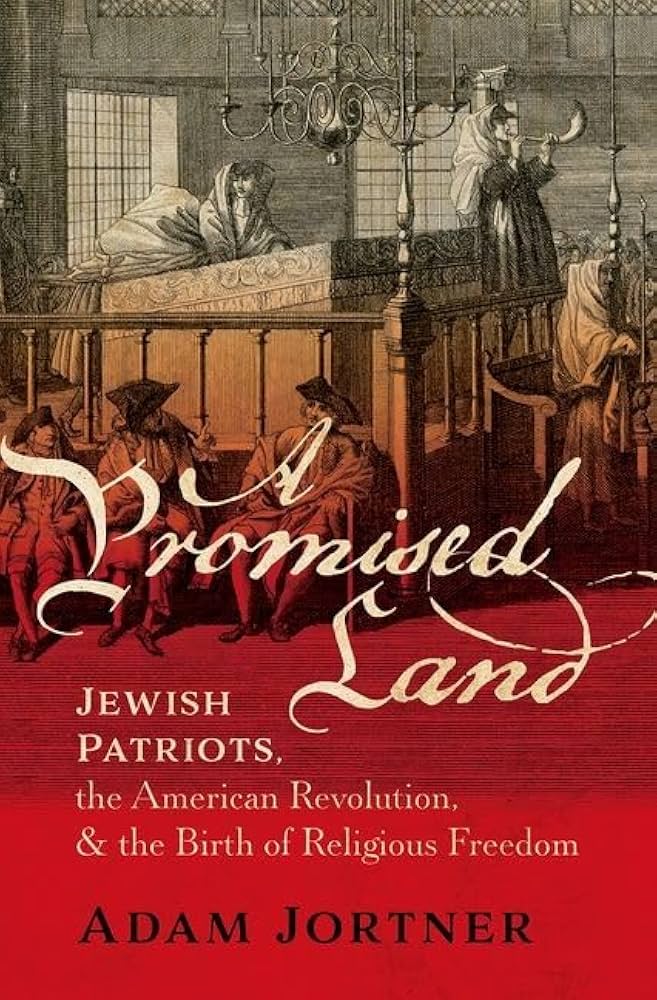A Promised Land by Adam Jortner
Jewish Patriots, the American Revolution, and the Birth of Religious Freedom

Adam Jortner’s book, A Promised Land: Jewish Patriots, the American Revolution, and the Birth of Religious Freedom, explores the role of Judaism during America’s founding.
I’ve always been a U.S. history buff. There’s not a family vacation that didn’t involve both baseball and historical sites. If there’s an opportunity to visit a presidential home or museum, I’m going to take it. When my family visited Philadelphia in 1999 and 2007, going to Independence National Historical Park was a must. Same, too, for the many historic sites that make up Boston’s iconic Freedom Trail. Hell, I wrote an entire paper on why John Adams should have a memorial in Washington when I participated in the Junior Statesmen Summer School program at Northwestern in 2002. If there’s a book, documentary, or film about the American Revolution in general, it’s always going to pique my interest! As you can imagine, my eyes lit up when I learned of a book about the role of Jews during the American Revolution!
I’ve been a bit backed up in writing book reviews but better late than never. I read Jortner’s book during the first days of Sukkot this past October. At 259 pages before getting into the acknowledgements and notes, it’s a rather quick read. To be fair, it was a three-day Yom Tov so it was either eat, pray, sleep, or read. I started reading after the dinner on that Wednesday and finished reading following dinner on Friday night.
There’s a lot that makes this book rather relevant right now, especially as the U.S. Constitution and American democracy comes under attack. For one, Jortner seeks to dismantle the myth of America’s founding as a Christian nation. We hear all this talk of American being founded on Judeo-Christian values. I personally prefer not to use the term but it is what it is. In any event, Jews were right there along the Protestants and others who fought for American independence.
Going into the book, I knew about Haym Salomon and his role as a financier during the American Revolution. A lot has been said about him—Warner Bros. even released a patriot short film—but Jortner breaks down the myth and legend. How much is true and how much was blown out of proportion? If you read this book, you’re going to find out!
Jortner notes that “American Jews served in the patriot army in direct proportion to their numbers in the general population.” This was more than likely one-tenth of 1%. Most of the Jewish community was based in Charleston, New York, Philadelphia, Newport, and Savannah in 1776. By 1780, most of these cities were occupied or had been occupied by British forces. The Jewish community of Philadelphia would triple in size with Mikveh Israel becoming the patriot congregation.
The new Philadelphia shul leadership model—itself adopting both the language and style of the American Revolution—would spread across shuls throughout the US in its early years. As other Jews returned to their previous towns, they would found or refound their shuls. Rather than turning to yeshivas on halachic matters, the board (adjunta) would vote on it instead.
Many patriotic Jews fought against the British. At the Battle of Beaufort in South Carolina, one of the patriot militias was referred to as “the Jew Company” as 28 of their 40 members were Jewish. They preferred to be called “the Free Citizens.”
As far as Judaism’s role at our nation’s birth, Jortner writes:
“Whenever and wherever American Jews petitioned for full citizenship after the war, they received it. The lack of religious restrictions on citizenship was one of the most radical results of the revolution. The rhetoric of 1776 valued autonomy over confession. The state did not derive from the church, but from the people…The Jews were among the governed, and they gave their consent, joining the fight against Britain.”
Many states had test oaths required to serve in office before the war. After the war, Jews petitioned for an end to such oaths so that they could be eligible to hold office. If Jews were equal American citizens, why should they be prevented from running for office because of being Jewish? By 1792, all states with a shul no longer had a test oath or no longer enforced it. Jortner writes:
“The granting of rights to non-Christians—however few in number—was an immediate result of Jewish patriot efforts during the war and its aftermath. Jewish citizenship came from the revolution.”
What we can take away from the role of Judaism during the American Revolution is that both religious freedom and religious diversity where there at the American Founding. Anyone who seeks to turn our nation into a Christian nationalist country is going against the Founding Fathers.
Adam Jortner’s A Promised Land: Jewish Patriots, the American Revolution, and the Birth of Religious Freedom rewrites history in that it completely changes what we thought we knew about America’s birth. The book is essential reading for anyone with an interest in Jewish-American history, the American Revolution, or American history in general.